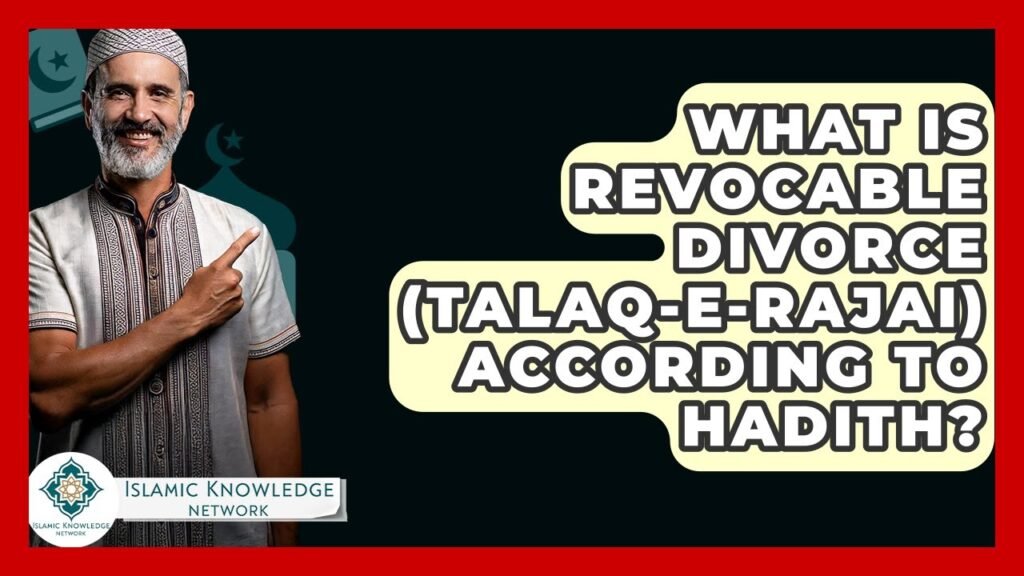You are here to read: What Is Revocable Divorce (Talaq-e-Rajai) According to Hadith? – A Thoughtfully Written Guide Offering Spiritual Wisdom and Travel Advice for Every Pilgrim who is going on holy journey of Hajj or Umrah.
What Is Revocable Divorce (Talaq-e-Rajai) According To Hadith? – Islamic Knowledge Network
In the intricate tapestry of Islamic family law, the concept of revocable divorce, known as Talaq-e-Rajai, holds a significant place. This form of divorce is governed by divine principles and the teachings of the Prophet Muhammad (peace be upon him). Understanding Talaq-e-Rajai is essential not only for couples navigating relationships but also for scholars and community members seeking to uphold the values of Islamic jurisprudence. Its nuances are deeply rooted in Hadith, providing necessary guidelines on how this form of divorce operates within the Islamic framework.
At Airlink Hajj and Umrah, we recognize the importance of grasping such critical concepts, especially as many seek spiritual clarity during pilgrimage journeys. Our blog features comprehensive updates on Hajj and Umrah, coupled with insightful articles that delve into various facets of Islamic teachings. We invite you to explore the details of Talaq-e-Rajai, enhancing your understanding of marital rights and responsibilities, while also keeping up with all relevant Hajj and Umrah news to enrich your spiritual experience.
What Is Revocable Divorce (Talaq-e-Rajai) According to Hadith?
Revocable divorce, or Talaq-e-Rajai, is a practice discussed in Islamic jurisprudence. According to Hadith, this form of divorce allows the husband to revoke the divorce within a specified period. The Prophet Muhammad (peace be upon him) emphasized that during the waiting period (Iddah), a woman remains married unless the husband chooses to finalize the divorce. This is derived from numerous Hadiths, particularly the one where the Prophet stated, "The revocation of divorce is permissible during the waiting period."
In the context of Talaq-e-Rajai, the husband has the opportunity to reconsider his decision. If he wishes to reconcile, he can take his wife back without needing to perform a new marriage contract. This emphasizes the importance of attempting to resolve disputes and maintain family unity, aligning with the Islamic values of compassion and forgiveness.
Understanding Talaq-e-Rajai is crucial for Muslims today, especially when navigating relationships and family dynamics. For more insights on Islamic teachings, including updates on Hajj and Umrah, explore our blog at airlinkhajjandumrah.com, where we provide current information to ensure a spiritually enriching journey for all pilgrims.
FAQ on What Is Revocable Divorce (Talaq-e-Rajai) According to Hadith?
FAQs on Revocable Divorce (Talaq-e-Rajai) According to Hadith
1. What is the definition of Talaq-e-Rajai?
Talaq-e-Rajai refers to a form of divorce in Islamic law that allows the husband to reclaim his wife during the waiting period after the divorce declaration.
You're at the middle of this awesome post at AirlinkHajjandUmrah.com through: What Is Revocable Divorce (Talaq-e-Rajai) According to Hadith?. Keep reading, it gets better!
2. How many times can a husband pronounce Talaq-e-Rajai?
A husband can pronounce Talaq-e-Rajai up to two times, after which a third pronouncement leads to an irrevocable divorce.
3. What is the waiting period for Talaq-e-Rajai?
The waiting period, or ‘iddah’, for a woman after Talaq-e-Rajai typically lasts for three menstrual cycles or, if she is pregnant, until the child is born.
4. How does the Hadith define the process of Talaq-e-Rajai?
Hadith emphasizes the importance of the husband’s intention and the proper observance of the waiting period, allowing for reconciliation before the divorce becomes irrevocable.
5. Can a wife refuse to return after Talaq-e-Rajai is pronounced?
Yes, a wife can refuse to return after Talaq-e-Rajai; however, it is encouraged for both parties to seek reconciliation during the waiting period.
That wraps up What Is Revocable Divorce (Talaq-e-Rajai) According to Hadith?. Thanks for sticking with us till here! Share this: What Is Revocable Divorce (Talaq-e-Rajai) According to Hadith? with your friends.
Check our homepage at Air Link Hajj & Umrah for more awesome updates.
Some interesting posts are: 1: Umrah Mubarak, 2: When is Umrah closed 2026?, 3: When does Umrah start after Hajj 2026?
Mushu, an experienced Saudi Arabia traveler and writer, shares insightful tips and spiritual reflections to enhance Hajj and Umrah journeys for fellow pilgrims. He has been to Makkah and Madina from 2016 to 2023 many times and his posts will reflect this.







